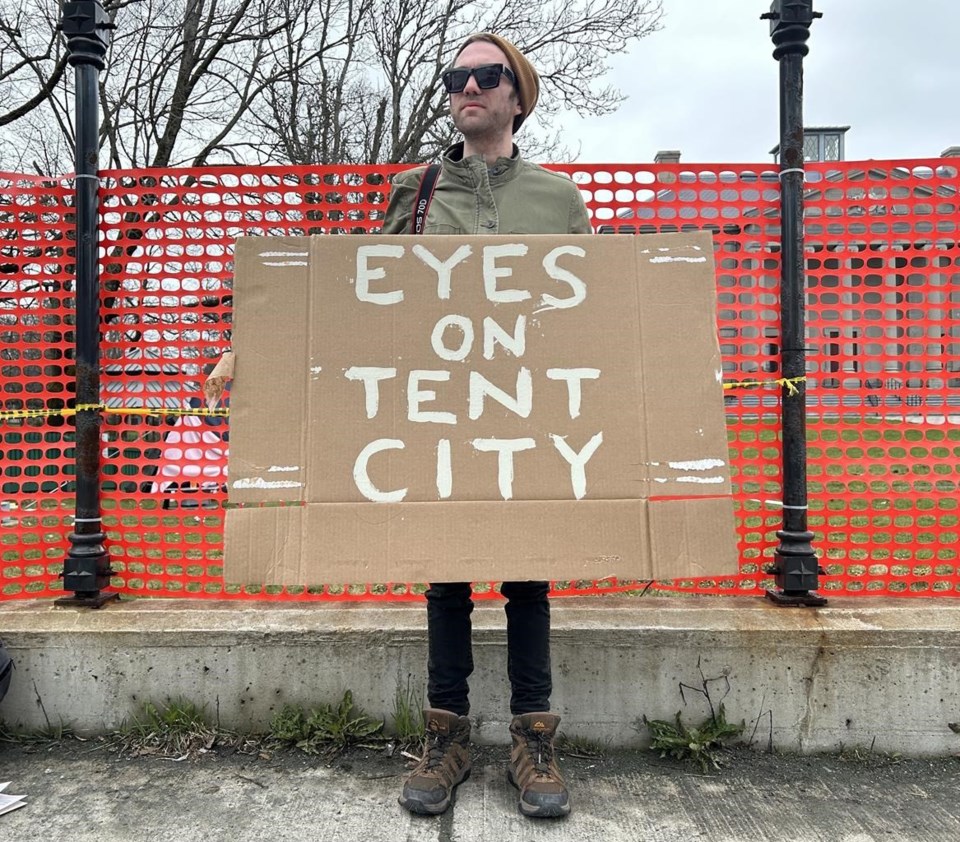ST. JOHN'S, N.L. — The Newfoundland and Labrador government has torn down a homeless encampment where some residents said they had been living in order to escape unsafe and "disgusting" conditions in the province's shelters.
Gregory McCain was among the last to be forced out of the tent city that had formed in the heart of St. John's. Since he was evicted Friday, he said he has been living in another tent on the outskirts of the provincial capital because he refuses to sleep in a shelter.
"Some shelters are completely disgusting," he said in an interview Monday. "It's like, spit on the walls, literal feces, body fluids."
"I've been beaten up a lot in shelters, whether they got security or not," he added. "It's easy for your possessions to be stolen. It's just harder."
Residents of the encampment beside the historic Colonial Building woke up Friday morning to ribbons of orange plastic fencing around the site. Workers in hazmat suits and balaclavas then arrived and began taking tents down, according to footage broadcast on social media by Tent City for Change, the group of volunteers who had been helping encampment residents secure food and supplies.
By the end of the day, nothing was left in the area except the orange fencing, which was still up on Sunday evening. Tents had been there since last fall, and some residents had said they preferred braving the winter in a nylon tent over sleeping in the province's shelter network.
John Abbott, the province's infrastructure minister, said Friday the encampment was taken down in part because of safety concerns arising from a fire there in late April. The orange fencing was up to "secure the site, but also to prohibit others from coming to tent."
Nine of the 12 people who had been living in tents at the encampment accepted beds in shelters or hotels on Thursday night, before officials went in the following day to clear out the area, he added.
"In a sense, we are making sure that the individuals are housed, so nobody is being forced off the site," Abbott said. "But as the tents are being removed … we're going to limit access to that site and any other public spaces managed by the provincial government."
Several people gathered at the tent city site to protest the evictions on Friday. Jeremy Nolan stood on the sidewalk in front of the historic building's lawn, holding a sign that read, "Eyes on tent city."
"People know this is wrong," Nolan said about the masked workers emptying out the encampment.
Municipal governments in Halifax and Edmonton have also forced people out of encampments this year. The federal housing advocate has repeatedly said that while governments must provide stable, permanent homes to unhoused people as quickly as possible, those people have a right to live in encampments if adequate housing is not on offer.
Marie-Josée Houle's sweeping report on encampments released in February said that forcibly removing people from them is a violation of the fundamental human right to housing.
Abbott said the government's actions were in step with Houle's recommendations — since residents of the St. John's tent city were offered "housing alternatives" they were comfortable with, they were not evicted.
"From a human rights perspective, we're very conscious of that," he said, suggesting the province's decision to dismantle the camp didn't violate anyone's rights. "Obviously our lawyers would have advised us accordingly."
McCain doesn't agree that he was offered housing that made him comfortable.
He said his tent was taken on Friday and he left with his backpack of supplies, including his wool blanket and a cook stove. With help, he found another tent and set up camp again, this time in a wooded area on the outskirts of the city.
"I got it covered over with some sticks and that," he said. "In a week or two when the trees start with their leaves, nobody will be able to find me."
This report by The Canadian Press was first published May 6, 2024.
Sarah Smellie, The Canadian Press




